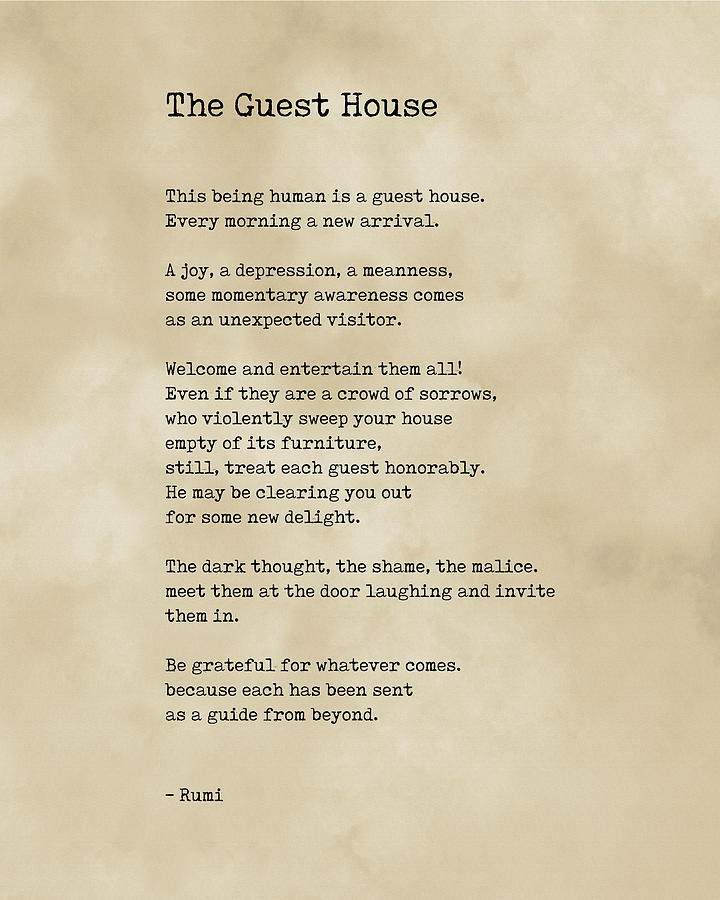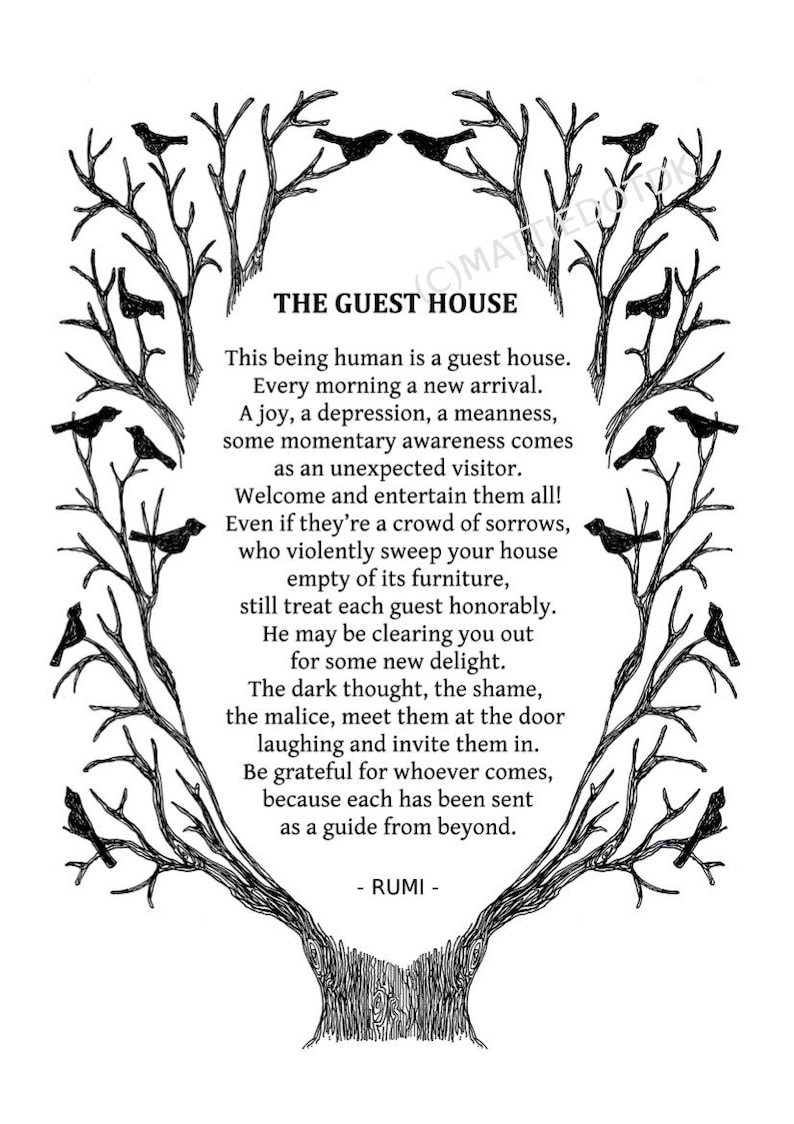Poem: The Guest House by Mewlana Jalaluddin Rumi
Table Of Content

We love to share poetry that resonates with our values here at Grateful Living. It is with happy hearts that we celebrate and share the value of poetry by offering you an opportunity to receive a poem each month in your inbox. A joy, a depression, a meanness,some momentary awareness comesas an unexpected visitor. By the time of his death, Markham had amassed a huge library of over 15,000 books. This collection was bequeathed to Wagner College's Horrmann Library on Staten Island.
Eating Chocolate Ice Cream: Reading Mayakovsky
A house of love with no limits,a presence more beautiful than venus or the moon,a beauty whose image fills the mirror of the heart. So he speaks, and everyone aroundbegins to cry with him, laughing crazily,moaning in the spreading unionof lover and beloved. In 1898, Markham married his third wife, Anna Catherine Murphy (1859–1938), and in 1899 their son Virgil Markham was born.
Learn more
An accomplished and popular lecturer, Markham also wrote essays, popular articles that discussed his own compositional approaches, and introductions to the works of others. Among the latter, his subjects included John Keats, John Greenleaf Whittier, and Henry Wadsworth Longfellow. His efforts to raise public awareness of social ills were capped by contributions to a major volume examining child labor, Children in Bondage, in 1914. The poet uses the refrain “heap o’ livin’ in it” again in the second line of this stanza, reminding readers (in the speaker’s characteristic style) of the importance of loving the place one calls home and appreciating it. We're Luciana and Anna - best friends, mums, and the souls behind this blog.
A Day of Reflection, Pride and Spoken Poetry with Denice Frohman — The Corsair - The Corsair
A Day of Reflection, Pride and Spoken Poetry with Denice Frohman — The Corsair.
Posted: Wed, 12 Oct 2022 07:00:00 GMT [source]
Five Element Personality Types (with Quiz)
The PDF Guide consists of a front cover, table of contents, with the full analysis, including the Poetry+ Review Corner and numerically referenced literary terms, plus much more. The speaker concludes this stanza by equating poor and wealthy homes, saying that the same principle applies to both. One needs to have their “soul…wrapped round everything” before it feels like home. It doesn’t matter, in the end, how much one’s home costs or how much the furniture within it is worth.

This mindfulness encourages us to fully engage with both the joys and challenges we encounter, understanding that each has its time and place. By bravely facing these challenging emotions, we learn resilience and find new depths of courage within ourselves. However, Rumi’s wisdom teaches us that these ‘unwelcome guests’ often carry the most significant lessons, pushing us towards unexpected growth and enlightenment. As women, we often feel the pressure to maintain composure, to be the rock for others. But Rumi tells us to embrace every emotion, be it joy, depression, or meanness. Just as guests leave a home slightly changed, each emotion we encounter and embrace leaves us slightly transformed.
Further Readings
Centuries ago, in a world not so different from ours, Jalaluddin Rumi a mystic poet, crafted words that would echo across time and continues to resonate with hearts and minds today. Rumi was deeply religious, so he interpreted that the thoughts and emotions were sent to us from the beyond. As I said in my article on this topic, acceptance is not about the exterior, but about the interior.
Edgar Guest's "Home" and Marianne Moore's "Silence": Where pop meets Modernism through dialect. - Slate
Edgar Guest's "Home" and Marianne Moore's "Silence": Where pop meets Modernism through dialect..
Posted: Tue, 04 Oct 2011 07:00:00 GMT [source]
Join the Poetry Chatter and Comment
This poem, “The Guest House,” is a timeless piece that speaks to the very core of our human experience, and here’s why it still matters, especially for us women navigating the complexities of modern life. Yes, “The Guest House” can be considered a guide to mental health, as it promotes a healthy way to cope with various emotions. By advising readers to welcome all emotions without judgment, Rumi encourages a mindful and accepting approach to mental well-being. The poem ‘Home’ is about how much living, loving, and suffering it takes to turn a house into a home.
“The Guest House” by Rumi
It touches on something everyone can connect to— the importance of having and loving one’s home. ‘Home’ is a four-line ode to the importance of “home” and how homes are created. Rather than physical creation, the poet focuses on how one gains an emotional and spiritual connection to a house. ‘Home’ by Edgar Guest is a four-stanza poem that uses eight-line in each stanza, also known as octaves. These eight-line stanzas follow a simple rhyme scheme of AABBCCDD with different end sounds in each stanza. The poet’s simple rhyme scheme is furthered by his use of a country-style dialect.
Mewlana Jalaluddin Rumi Follow
Following the Treaty of Guadalupe Hidalgo, Pico became a private citizen and a successful businessman and served on the Los Angeles City Council. One of Los Angeles's major thoroughfares, Pico Boulevard, is named for him. He built and owned Los Angeles’ first major hotel, the Pico House, in 1870, located in the El Pueblo de Los Angeles (Olvera St). Around 1850, Pio Pico bought the Rancho Paso de Bartolo Viejo from the heirs of Juan Crispin Perez.
It doesn’t matter, the poet writes, how much the home is worth. The word “gradjerly,” or “gradually” is used in the next line to imply that turning a house into a home is a gradual process that can’t be rushed. As time goes by, one will find that there is nothing in their home that they want to part with, even if it isn’t worth a great deal.
As we revisit these challenges at different seasons of life, they reveal new layers of meaning and insight, helping us to grow and evolve in unexpected ways. In the context of Rumi’s Guest House, each visitor – or emotion – we encounter can be seen as a potential teacher. Rumi’s teachings urge us to embrace the present moment, recognizing the transient nature of our experiences. It teaches us to be more compassionate with ourselves and others, as we recognize that everyone has their own set of challenging guests.
Comments
Post a Comment